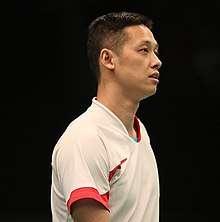Hu Yun
Hu Yun (Chinese: 胡贇; born in Hubei 31 August 1981) is a male badminton player representing Hong Kong since 2006.[1] He competed at the 2010 and 2014 Asian Games, and also 2016 Rio Olympics. Hu started playing badminton in 1988.[1][2] In 2006, he started to represented Hong Kong at the international tournament. He won the Hong Kong National Badminton Championships four times, in 2007, 2009, 2010, and 2012.[3]
| Hu Yun | ||||||||||||||
|---|---|---|---|---|---|---|---|---|---|---|---|---|---|---|
 | ||||||||||||||
| Personal information | ||||||||||||||
| Birth name | 胡贇 | |||||||||||||
| Born | August 31, 1981 Hubei, China | |||||||||||||
| Height | 1.80 m (5 ft 11 in) | |||||||||||||
| Weight | 71 kg (157 lb) | |||||||||||||
| Handedness | Right | |||||||||||||
| Men's singles | ||||||||||||||
| Highest ranking | 4 (13 June 2013) | |||||||||||||
| Current ranking | Retired | |||||||||||||
Medal record
| ||||||||||||||
| BWF profile | ||||||||||||||
Achievements
BWF Superseries
The BWF Superseries has two level such as Superseries and Superseries Premier. A season of Superseries features twelve tournaments around the world, which introduced since 2011, with successful players invited to the Superseries Finals held at the year end.
Men's Singles
| Year | Tournament | Opponent | Score | Result |
|---|---|---|---|---|
| 2015 | Singapore Open | 17–21, 21–16, 15–21 | ||
| 2015 | Japan Open | 14–21, 12–21 | ||
| 2012 | China Masters | 11–21, 13–21 |
- BWF Superseries Finals tournament
- BWF Superseries Premier tournament
- BWF Superseries tournament
BWF Grand Prix
The BWF Grand Prix has two level such as Grand Prix and Grand Prix Gold. It is a series of badminton tournaments, sanctioned by Badminton World Federation (BWF) since 2007.
Men's Singles
| Year | Tournament | Opponent | Score | Result |
|---|---|---|---|---|
| 2016 | Thailand Masters | 18–21, 19–21 | ||
| 2009 | Philippines Open | 13–21, 6–21 |
- BWF Grand Prix Gold tournament
- BWF Grand Prix tournament
References
- "Players: Hu Yun". Badminton World Federation. Retrieved 10 June 2017.
- "赞!36岁胡赟赴港拼搏已十年 期盼能打到2024年" (in Chinese). Sina Sports. Retrieved 10 June 2017.
- "体育之星 羽毛球 胡赟" (in Chinese). Sina Sports. Retrieved 10 June 2017.